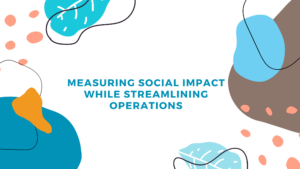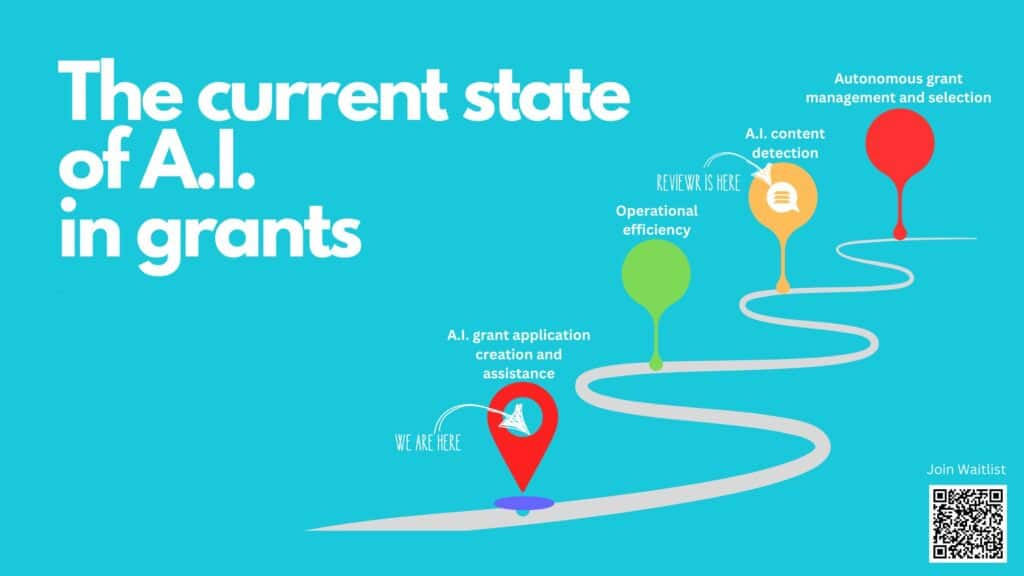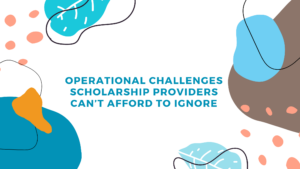
Measuring Social Impact While Streamlining Operations
Schedule a Demo View Interactive Tour A Deep Dive into How Brands and Foundations Can Power Purpose-Driven, Data-Backed Scholarship and Grant Programs
On November 30, 2022, OpenAI (ChatGPT) changed the game for grant providers forever.
Before this date – grant providers relied on essays and personal storytelling to separate grant applicants from raw metrics such as financial need, test scores and academic accolades. They were a way for applicants to showcase their unique qualities and personalities – separating them from the thousands of other applicants in the competitive grant ecosystem.
So what happened on November 30th? OpenAI released an early demo of ChatGPT resulting in the A.I. chatbot going mainstream. Instagram and TikTok were flooded with people recording innovative ways to leverage ChatGPT to streamline tedious tasks such as travel planning, writing computer code, and more. Google search trends went crazy.
Fast forward less than 2 years and grant providers are now facing challenges never seen before – A.I. generated grant applications and essays. What was once a way to separate qualified applicants from a crowded room of other qualified applicants for limited resources is now a game of cat and mouse to identify authenticity. And while we are 17 months removed from the introduction of ChatGPT – we are only at the precedent of how A.I. will impact grants in the coming years. This Google search trend looks awfully familiar.
Understanding A.I. and its Current Impact on Grant Management
Artificial Intelligence (A.I.) operates by analyzing large amounts of data and learning from patterns to make decisions or generate content. Grant applicants frequently use A.I. for writing by inputting prompts or topics, allowing the A.I. to assist in structuring essays or solely writing them for the applicant. In recent research amongst grant providers, we have identified a significant concern of essays being written with the assistance of A.I. tools like ChatGPT. This research highlights a growing reliance on A.I. for enhancing the quality of submissions, although there is a crucial distinction to be made between using A.I. as a supportive framework versus having it generate content from scratch.
So, what does the current state of A.I. utilization look like in Grants?
Ok, so grant applicants copy and pasting essay prompts into tools such as ChatGPT and using the results as their own work is probably not what grant providers are looking for. But in what ways can A.I. be leveraged for good in grant management

Grant providers offer Grants with a wide range of criteria, eligibility, and requirements. Often, applicants may not be aware of the opportunities available to them resulting in unfunded grants or applicants applying for everything, and anything, resulting in wasted time and energy from both the applicant and the grant provider.
Capturing essential information from applicants equips grant providers with the data necessary to create a personalized experience that enhances the applicant experience and strengthens data integrity.
In a world of competitive grants, program managers and grant providers are looking for ways to narrow down the initial applicant pool to a smaller number for a more indepth and thorough review.
While leveraging A.I. to completely write essays or personal stories is advised against – using A.I. to assist with generating content that empowers the applicant be the best version of themselves and position themselves for success is promoted.
Finally, the elephant in the room. We know grant applicants WILL use A.I. to assist with their grant content creation. We also are PROMOTING the usage of A.I. to help generate the framework for a well structured grant application and essay – so where do we draw the line? How much A.I. is too much?
Ultimately, this is a decision and question grant providers must ask themselves. Here are some themes to consider:
So, what can we do to better identify the utilization of A.I. generated content and plagiarized material? Reviewr is excited to announce “Sidekick”, an integrated A.I./plagiarism detection tool for grants powered by Reviewr.
Sidekick is intended to flag applicants for grant providers and provide them the resources needed to make data driven decisions.
Detects what percentage of grant content is A.I. generated.
Artificial intelligence streamlines administrative workflows by automating routine tasks and optimizing data management. This enhances efficiency and accuracy, empowering grant providers to spend less energy managing, and more energy making an impact.
At it’s core, Reviewr was developed to not only streamline administrative grant management efforts, but more importantly, enhance the experience for both applicants and review teams. This means ensuring each applicant gets the fair change they deserve by eliminating potential bias reviews and unstructured review workflows. Gone are the days of applicants landing in spam and not getting included in the review or being unfairly evaluated based on personal bias.
Another component of “Sidekick” – Evaluation Normalization.
I love the show Shark Tank and “Mr Wonderful” is easily my favorite shark. But what if the entrepreneurs pitching their business ideas got judged by different judges than one another? For example, what if I landed Mr Wonderful but someone else got Barbara? What if the scorecards they used were on a scale of 1-30 and Mr. Wonderful gave me a 19 and Barbara gave someone a 30? What if Mr. Wonderful never gives a 20 – does that make getting a 19 bad? If the show used total and average scores than anyone that Mr. Wonderful scored would naturally be lower in the rankings – is this fair?
Introducing “Evaluation Normalization” This. Is. Big.
“Hey Sidekick, how’d we do”?

Not too shabby. The landscape of grant management is rapidly evolving with the integration of AI technologies. As demonstrated, AI brings about transformative changes across various aspects of grant management, from intelligent automation to enhanced content creation, plagiarism detection, streamlined administrative workflows, and ensuring fair, non-biased selection processes.
The utilization of AI in grant management introduces efficiency and accuracy by automating routine tasks, matching applicants with relevant opportunities, and facilitating personalized experiences. Moreover, AI aids in content creation by empowering applicants to generate high-quality submissions while mitigating the risk of plagiarism through innovative detention methods.
Furthermore, AI-driven systems streamline administrative workflows by categorizing and summarizing applications, ensuring fair evaluations by matching judges with applicants, and normalizing evaluation results to eliminate bias. These advancements not only enhance the efficiency of grant management but also uphold fairness and integrity in the selection process.
As we embrace the future of grant management in 2024, it becomes evident that AI will continue to play a pivotal role in revolutionizing how grants are administered, ensuring equitable opportunities for all deserving applicants while optimizing resource allocation for grant providers.
Bonus: If you’re interested in using “Sidekick” sign up for our waitlist and preview the tool. By signing up you are not obligated to using Reviewr, but you will be locked into the current pricing model before changes are made in the coming months.

Schedule a Demo View Interactive Tour A Deep Dive into How Brands and Foundations Can Power Purpose-Driven, Data-Backed Scholarship and Grant Programs

Schedule a Demo View Interactive Tour Insights from 500 scholarship provider interviews Bridging the Gap Between Mission and Execution Scholarship programs
